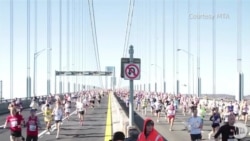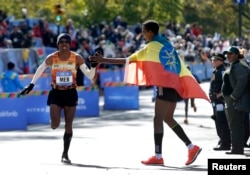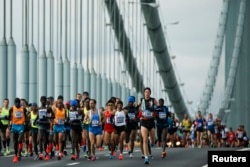More than 50,000 runners will make their way to the starting line in the borough of Staten Island on November 1, for the start of the world’s most famous annual races - the New York City marathon. The race course runs a total of 42.195 km through all five boroughs of New York City, ending up at the finish line in Central Park.
A Kenyan man has won the past three marathons and for the past two a Kenyan has finished 1st in the women's group. But a group of Ethiopians is training hard, hoping to win back the top prize after five years of Kenyan dominance.
Many Ethiopian runners train in New York City under the auspices of the West Side Runners Club. A vast majority of the club’s runners are foreign born and this year there is a large Ethiopian contingent.
Self trained
Club President Bill Staab says the Ethiopians are mainly self-trained.
“We don’t specifically train them,” he noted. “Some have been on the national team in Ethiopia. They have had a lot of international racing experience in all distances, particularly the marathon and they try to excel here and also win a little prize money when they can and often they do."
According to Staab, most of the Ethiopian runners he has affiliated with come from one particular region.
“Most of the ones we have in the United States are from the Oromo section of Ethiopia, which is farming and villages,” said Staab, adding that “they have to go very long distances to go to school, so they run. And, also the sport of running in Ethiopia is extremely prominent.”
Staab said “they are exceptionally good in the Olympics and in the international races, and this is their goal. Just as in the United States somebody from a poor working class community might want to become a boxer to raise their standard in life, if you become a great runner in Ethiopia you are famed for life.”
Most famous
Ethiopian runners consider double Olympic Marathon Gold Medalist Abebe Bikila as the most famous marathoner in Ethiopian history. Bikila came to prominence in the 1960 Olympics, defeating Moroccan Rhadi Ben Adbesselem by 26 seconds, and finishing in a then world record time of 2:15:16 hours.
What was most astonishing, Bikila set his mark by running the race through the cobblestone streets of Rome barefoot. Asked why, Bikila said, “I wanted the world to know that my country, Ethiopia, has always won with determination and heroism.”
The same determination that Bikila expressed, is on the faces and minds of today’s Ethiopian marathoners.
“I was dreaming to run this race,” Diriba Degefa Yigezu Bekogi, a 27 year old from the Oromo confided. This will be Diriba’s first marathon. He has won medals in other distance races in many countries around the world.
But he worries about his readiness for the November 1 race.
“I will try to run my personal best. This is my first race in the marathon, so I work on my training for two months for this race, but before that I ran and competed in different races," he said.
Staab explained what happens after the Marathon.
“Some will stay here for maybe forever, others will go back to their homes," he explained. "Some, of course, have families at home and children and they try to win some races to win some money to send back to their families, which is important.”
"Our goal is to make them feel comfortable while they are here," he added, speaking for his West Side Club. "We hope very much to give them every opportunity America has to offer.”
As the 2015 Marathon approaches, the Ethiopians practice twice a day, mornings and late afternoon. Their singular focus: becoming another Abebe Bikila.







